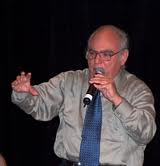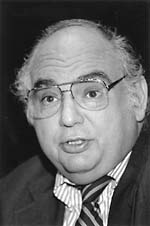 This two part documentary/extensive interview program with Bill Moyers had its genesis in the World of Ideas Series of 1990 that included interviews with novelists, theologians, community activists, philosophers, playwrights and social and natural scientists in an effort to explore the thoughts of the public intellectuals of our time. Moyers always considered these interviews as contributing to “the conversation of democracy.” World of Ideas was produced as a series in both 1988 and 1990. The Ernie Cortes two-parter aired during the 1990 season.
This two part documentary/extensive interview program with Bill Moyers had its genesis in the World of Ideas Series of 1990 that included interviews with novelists, theologians, community activists, philosophers, playwrights and social and natural scientists in an effort to explore the thoughts of the public intellectuals of our time. Moyers always considered these interviews as contributing to “the conversation of democracy.” World of Ideas was produced as a series in both 1988 and 1990. The Ernie Cortes two-parter aired during the 1990 season.
Ernie Cortes was already considered one of the five most influential men in Texas (according to Texas Monthly) when Moyers interviewed him in 1990. Trained through the Industrial Areas Foundation founded by Saul Alinsky, the Chicago based apostle of community organizing in the U.S., Cortes was organizing the poor and working poor throughout Texas. Community organizations that he helped build were taking on issues from water and sewer systems, to roads, education and public health. They were holding public officials accountable and affecting legislation pushing for millions of dollars in funding for schools, infrastructure, and job training. Now his reach was expanding throughout the Southwest and beyond through training sessions and in this documentary we follow him from community meetings in Phoenix linking middle class and poor folks, to Fort Worth and the Texas border with Mexico. We also watch him conduct a training session for community organizers in New York. His base began in San Antonio with an organization called COPS (Communities Organized for Public Service). Henry Cisneros said that COPS “fundamentally altered the moral tone and the political and physical landscape of San Antonio.”
“We organize people not just around people, but around values.” We follow Cortes as he interacts with organic leaders in church communities training them to really listen to each other, to pursue conversations about shared values and commitments, to build relationships of trust. Those relationships will be vital to forming the nucleus of an organization to confront locally elected officials and work for change. In the process communities and individuals are empowered to make larger and more demanding changes.
I scouted for many of the folks Moyers ended up interviewing for both series of World of Ideas and I produced at least a quarter of the interviews. During the first season I convinced Moyers to interview Cornel West who had never appeared on television before. Likewise, for Chinua Achebe, the African novelist who wrote what is considered the “first” African novel, Things Fall Apart. These interviews included truly fresh voices like the novelist, Bharati Mukherjee and Confucian scholar, Tu Wei Ming. A couple of the interviews I produced and directed ended up becoming two parters — like the interview with Toni Morrison which was nominated for a an Emmy. As was the interview with Vartan Gregorian and Ernie Cortes. And while I had originally proposed an interview with Bernice Johnson Reagon, I also knew that she really deserved a more ‘documentary’ treatment and that resulted in the special, The Songs are Free, posted elsewhere on this site.
World of Idea interviews that I produced and directed include: political theorist, Sheldon Wolin; historians,James MacGregor Burns, Henry Steele Commager, and Forest McDonald; Noble prize winning physicist, Murray Gell-Mann; novelists, Joseph Heller, E.L. Doctorow, and Tom Wolfe; popular Harvard philosopher of theories of justice,Michael Sandel; professor of religion, Stephen Rockefeller; and influential scientist, Steven Weinberg, and more.